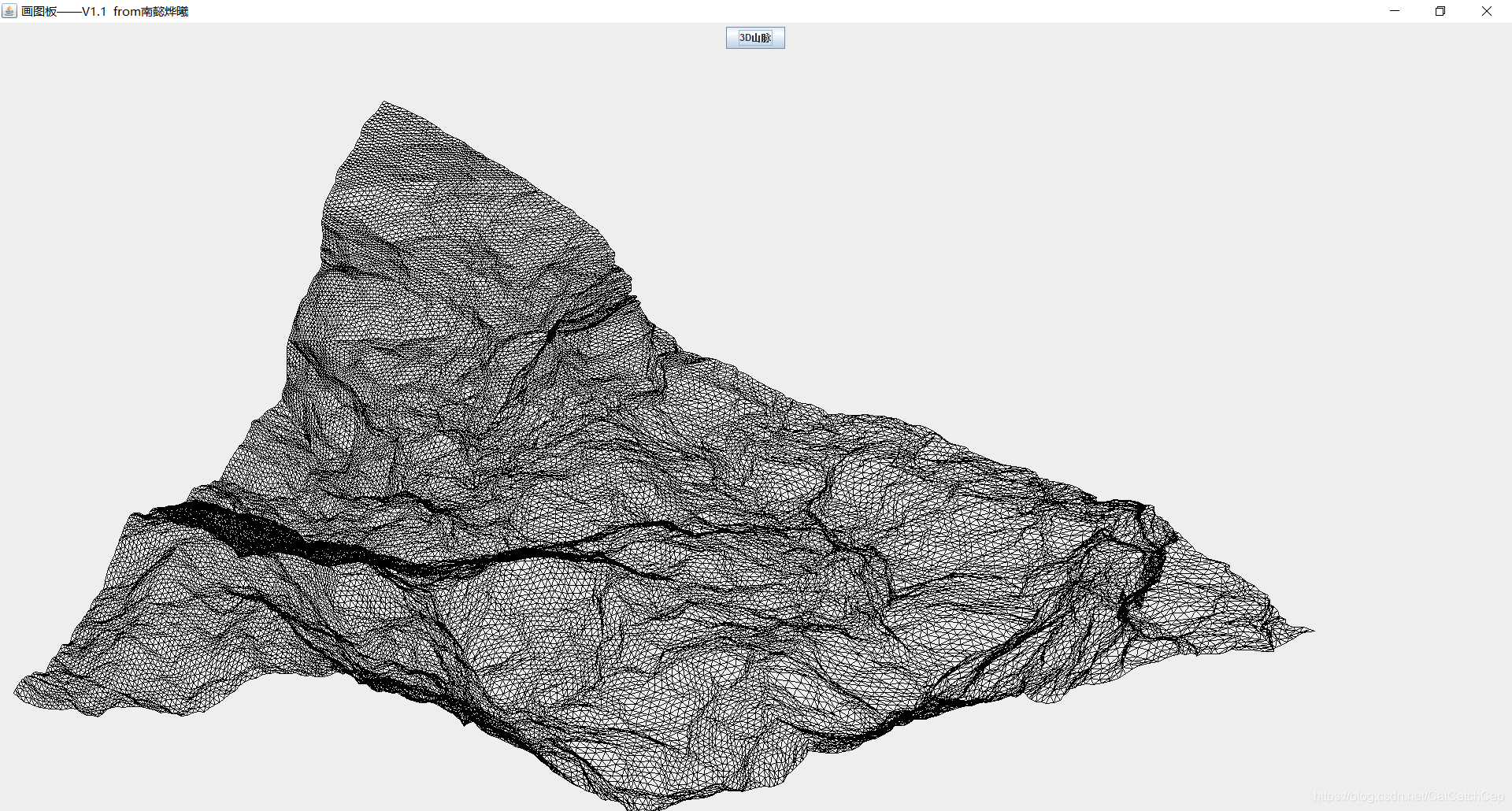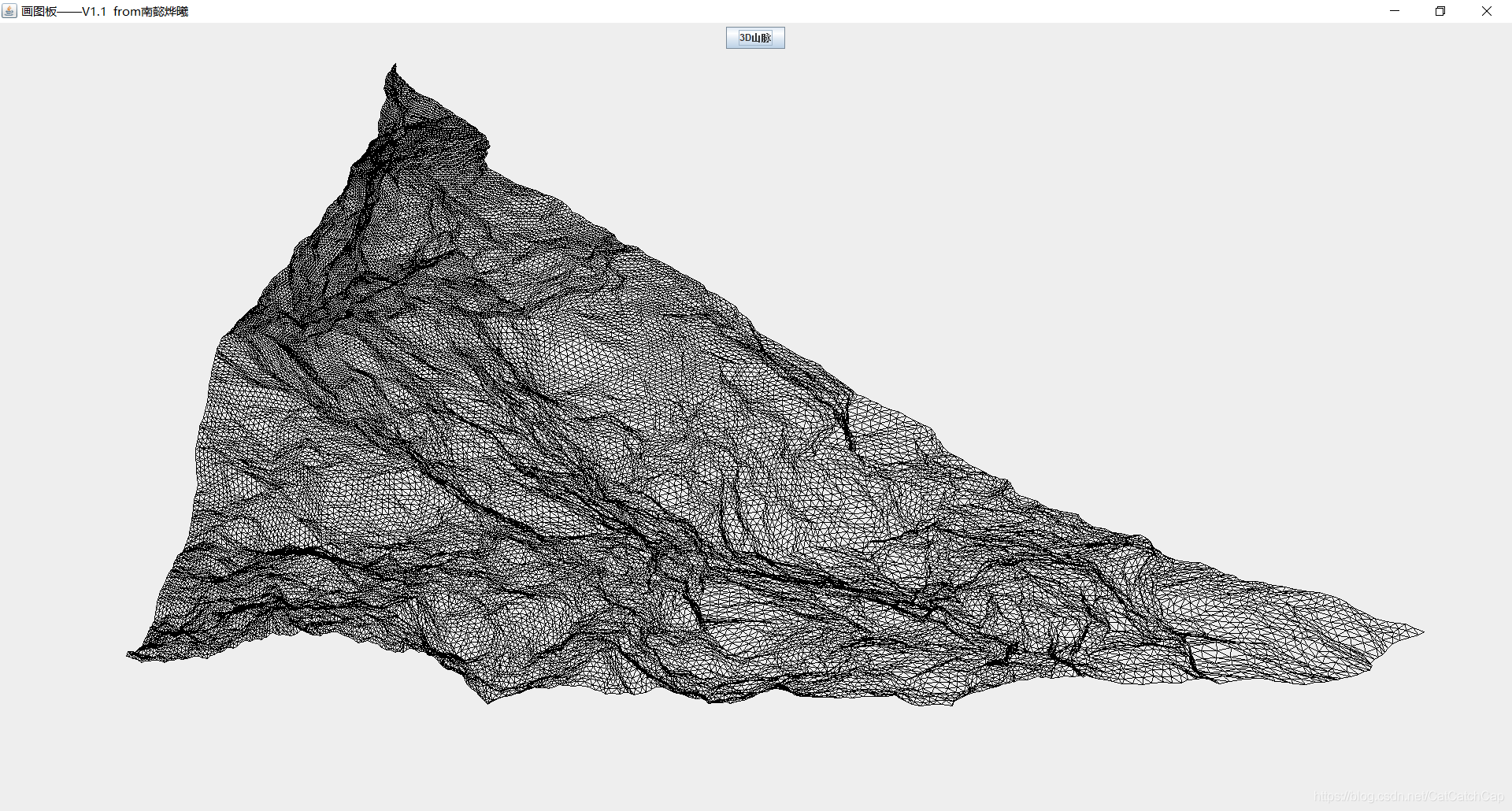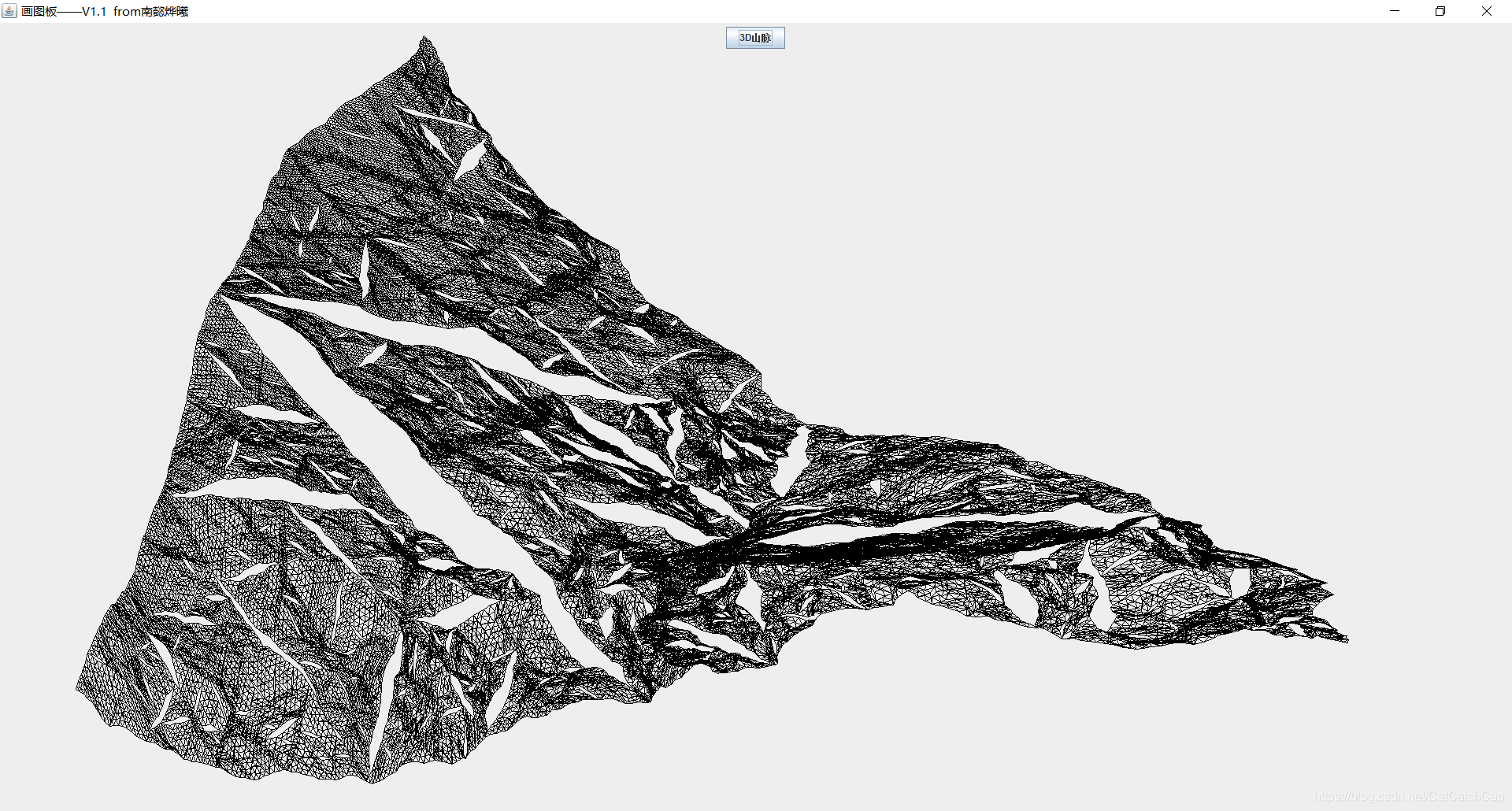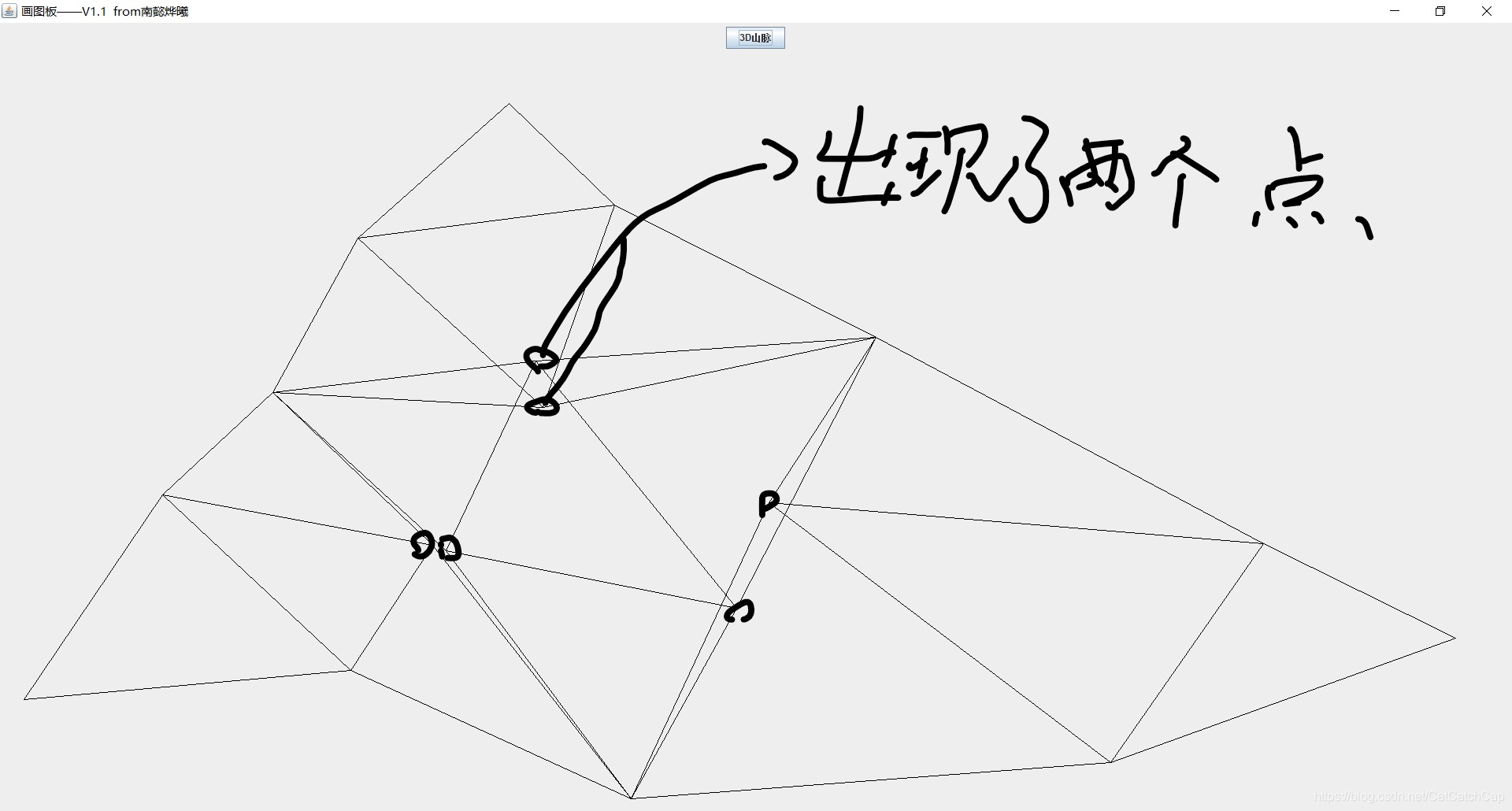做这个3D山脉搞了我一下午的时间,从开始的大体构造到一步一步地解决细节问题,在此篇文章中我将一一描述我在构造山脉时遇到的问题,希望对大家有帮助
先上效果图吧


基本原理

递归,分形的灵魂
首先我们在屏幕上随机取三个点,然后每两个点取中值动荡点,再利用新产生的点画三角形,最后就能有这样的3D效果
随机取三个点
int x1=rand.nextInt(200)+480;
int y1=rand.nextInt(200);
int x2=rand.nextInt(300);
int y2=rand.nextInt(100)+800;
int x3=rand.nextInt(300)+1600;
int y3=rand.nextInt(100)+800;
中值动荡点的生成
以一个点为例
double ranx1=(x1+x2)/k;//产生动荡值,k会随着迭代次数成倍增加
double rany1=(y1+y2)/k;
X1=(x1+x2)/2+rand.nextInt((int)ranx1*2+1)-ranx1;
Y1=(y1+y2)/2+rand.nextInt((int)rany1*2+1)-rany1;
基本点就是这样,下面我们来写这个迭代的具体方法
代码实现
我这里给出常见的错误代码,应该是最开始写这种东西都会有的错误
//参数分别为三个点的坐标,迭代层数,和震荡程度k
public void draw3D(Graphics g, int x1, int y1, int x2, int y2, int x3, int y3, int depth, int k) {
if (depth > 1) {
//取震荡值
double ranx1 = (x1 + x2) / k;
double rany1 = (y1 + y2) / k;
double ranx2 = (x2 + x3) / k;
double rany2 = (y2 + y3) / k;
double ranx3 = (x1 + x3) / k;
double rany3 = (y1 + y3) / k;
double Y1;
double X2;
double Y2;
double X3;
double Y3;
//中值震荡点
X1 = (x1 + x2) / 2 + rand.nextInt((int) ranx1 * 2 + 1) - ranx1;
Y1 = (y1 + y2) / 2 + rand.nextInt((int) rany1 * 2 + 1) - rany1;
X2 = (x2 + x3) / 2 + rand.nextInt((int) ranx2 * 2 + 1) - ranx2;
Y2 = (y2 + y3) / 2 + rand.nextInt((int) rany2 * 2 + 1) - rany2;
X3 = (x1 + x3) / 2 + rand.nextInt((int) ranx3 * 2 + 1) - ranx3;
Y3 = (y1 + y3) / 2 + rand.nextInt((int) rany3 * 2 + 1) - rany3;
//根据新的点迭代
draw3D(g, (int) x1, (int) y1, (int) X1, (int) Y1, (int) X3, (int) Y3, depth - 1, k * 2);
draw3D(g, (int) X1, (int) Y1, (int) x2, (int) y2, (int) X2, (int) Y2, depth - 1, k * 2);
draw3D(g, (int) X1, (int) Y1, (int) X2, (int) Y2, (int) X3, (int) Y3, depth - 1, k * 2);
draw3D(g, (int) X3, (int) Y3, (int) X2, (int) Y2, (int) x3, (int) y3, depth - 1, k * 2);
} else {
int[] px = { x1, x2, x3 };
int[] py = { y1, y2, y3 };
g.drawPolygon(px, py, 3);
}
}
我们看着这个代码会觉得没问题啊,逻辑很明确,但实际上这只完成了一半的工作,我们看看效果

出现了大量的空白,为什么?
我们把迭代次数调小一点看看
draw3D(g, x1, y1, x2, y2, x3, y3, /*9*/3, 8);
把9改为3
效果是这样的

原来,在迭代取中值震荡点的时候取到了两次,就产生了两个震荡点,这就是问题所在。
问题解决
要解决这样的问题有很多种方法,主要思路就是将每次生成的边存起来(两个点确定一条边),如果在迭代的过程中出现了相同的点,那么就不再生成中值震荡点,选用最初产生的中值震荡点,所以我们想到建立一个存储点和中值震荡点的方法。我这里选用的是最基础的方法,创建一个类来储存。
此类如下
public class Points {
Points(int x1, int x2, int y1, int y2, double X, double Y) {
this.x1 = x1;
this.x2 = x2;
this.y1 = y1;
this.y2 = y2;
this.X = X;
this.Y = Y;
}
int x1;
int x2;
int y1;
int y2;
double X;
double Y;
}
Points[] po = new Points[5000000];//创建足够大的数组存储对象
接下来就好办了,
每次产生一个之前未出现的边时就将其存入数组对象中
Points p = new Points(x1, x2, y1, y2, X1, Y1);
po[count ] = p;
count++;
然后在每次迭代的时候判断此边是否出现过即可
完整代码如下
public class Points {
Points(int x1, int x2, int y1, int y2, double X, double Y) {
this.x1 = x1;
this.x2 = x2;
this.y1 = y1;
this.y2 = y2;
this.X = X;
this.Y = Y;
}
int x1;
int x2;
int y1;
int y2;
double X;
double Y;
}
Points[] po = new Points[5000000];
Random rand = new Random();//创建随机数对象
int count = 0;
public void draw3D(Graphics g, int x1, int y1, int x2, int y2, int x3, int y3, int depth, int k) {
if (depth > 1) {
int u = 0, j = 0, o = 0;//这里必须要赋值,否则会报错说可能没有被赋予初始值,这个问题在c++里只是个warning。其实这里不赋值理论上也可,其没有值的时候也不会用到它们,细心的小伙伴可以看看是否是这样
double ranx1 = (x1 + x2) / k;
double rany1 = (y1 + y2) / k;
double ranx2 = (x2 + x3) / k;
double rany2 = (y2 + y3) / k;
double ranx3 = (x1 + x3) / k;
double rany3 = (y1 + y3) / k;
boolean f1 = true;
boolean f2 = true;
boolean f3 = true;
for (int i = 0; i < count; i++) {//边的确定,也就是两个点的确定一定要把x和y的坐标一起加上,我最开始认为只用判断横坐标即可,大家可以试试只判断横坐标出来的效果,我这里就不展示了
if ((x1 == po[i].x1 && x2 == po[i].x2 && y1 == po[i].y1 && y2 == po[i].y2)
|| (x1 == po[i].x2 && x2 == po[i].x1 && y1 == po[i].y2
&& y2 == po[i].y1){
f1 = false;
u = i;
break;
}
}
for (int i = 0; i < count; i++) {
if ((x2 == po[i].x1 && x3 == po[i].x2 && y2 == po[i].y1 && y3 == po[i].y2)
|| (x2 == po[i].x2 && x3 == po[i].x1 && y2 == po[i].y2
&& y3 == po[i].y1) {
f2 = false;
j = i;
break;
}
}
for (int i = 0; i < count; i++) {
if ((x1 == po[i].x1 && x3 == po[i].x2 && y1 == po[i].y1 && y3 == po[i].y2)
|| (x1 == po[i].x2 && x3 == po[i].x1 && y1 == po[i].y2
&& y3 == po[i].y1) {
f3 = false;
o = i;
break;
}
}
double X1;
double Y1;
double X2;
double Y2;
double X3;
double Y3;
if (f1 == false) {
X1 = po[u].X;
Y1 = po[u].Y;
} else {
X1 = (x1 + x2) / 2 + rand.nextInt((int) ranx1 * 2 + 1) - ranx1;
Y1 = (y1 + y2) / 2 + rand.nextInt((int) rany1 * 2 + 1) - rany1;
Points p = new Points(x1, x2, y1, y2, X1, Y1);
count++;
po[count - 1] = p;
}
if (f2 == false) {
X2 = po[j].X;
Y2 = po[j].Y;
} else {
X2 = (x2 + x3) / 2 + rand.nextInt((int) ranx2 * 2 + 1) - ranx2;
Y2 = (y2 + y3) / 2 + rand.nextInt((int) rany2 * 2 + 1) - rany2;
Points p = new Points(x2, x3, y2, y3, X2, Y2);
count++;
po[count - 1] = p;
}
if (f3 == false) {
X3 = po[o].X;
Y3 = po[o].Y;
} else {
X3 = (x1 + x3) / 2 + rand.nextInt((int) ranx3 * 2 + 1) - ranx3;
Y3 = (y1 + y3) / 2 + rand.nextInt((int) rany3 * 2 + 1) - rany3;
Points p = new Points(x1, x3, y1, y3, X3, Y3);
count++;
po[count - 1] = p;
}
draw3D(g, (int) x1, (int) y1, (int) X1, (int) Y1, (int) X3, (int) Y3, depth - 1, k * 2);
draw3D(g, (int) X1, (int) Y1, (int) x2, (int) y2, (int) X2, (int) Y2, depth - 1, k * 2);
draw3D(g, (int) X1, (int) Y1, (int) X2, (int) Y2, (int) X3, (int) Y3, depth - 1, k * 2);
draw3D(g, (int) X3, (int) Y3, (int) X2, (int) Y2, (int) x3, (int) y3, depth - 1, k * 2);
} else {
int[] px = { x1, x2, x3 };
int[] py = { y1, y2, y3 };
g.drawPolygon(px, py, 3);
}
}
事实上,用数组来存点的效率是很低的,但是,说来惭愧,我能力有限,可能在之后掌握了map和list等用法过后会加以改进的吧,如果有感兴趣的朋友的话可以找我一起讨论讨论,我的QQ是 869083577.




















 2235
2235

 被折叠的 条评论
为什么被折叠?
被折叠的 条评论
为什么被折叠?








